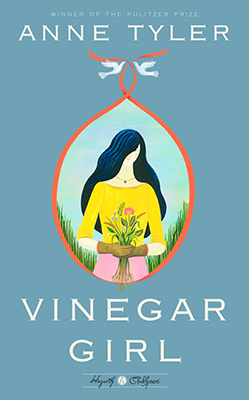ABOUT BOOKS
By Joan Bauer
In our world where “the spirit of the times,” according to Pulitzer Prize-winning author Marilynne Robinson, is “joyless urgency,” it is a pleasure to read an Anne Tyler novel. Few authors understand the nature of relationships and simple moments like she does.
VINEGAR GIRL by Anne Tyler
I finished Vinegar Girl with a sigh, with a smile, and with gratitude for the quiet way she wove a story of, well, shrewishness (this is a reworking of Shakespeare’s Taming of the Shrew). Although our shrew, Kate Battista, has reasons for her snark. She’s not an official shrew; she’s mostly just irritated.
“Too tall, too outspoken, too brassy,” 29-year-old Kate is stuck everywhere. She lost her mother after her much younger sister was born. She dropped out of college. Her father drives her crazy. She’s living at home, in charge, mostly, of her 15-year-old sister Bunny who is her polar opposite—blonde, perky, popular; while Kate has a thick, unattractive sense to her, except for her long, glorious hair. It’s as if life’s heaviness and it’s social expectations, which Kate doesn’t get, all work to make her tough like the beef jerky she chomps on. No one has sent her flowers. No one has professed love for her. No one has stayed around to be her friend. They have moved on, and she has stayed.
It’s not supposed to be like this. But Kate is dutiful. She goes to work each day at the Charles Village Little People’s School, where the little girls in Room 4 play break-up (the ballerina doll ditches the sailor doll, but he had it coming). She is an assistant there—no power—though an inability to mince words thuds heavily on the heads of nervous parents one too many times. The headmistress warns Kate—learn tact, restraint, and diplomacy, or you’re out. Kate tries to tame her bluntness but finds herself a stranger in a strange land. This is where Tyler’s lovely multi-layered theme of the struggle “to live in another language” begins.
It was once whispered about Kate, “She has no plan.” But her father has one, the kind that can land people in jail. Dr. Battista, a well-known autoimmune researcher (but not as famous as he wished), has a brilliant research assistant whose 0-1 Visa is about to expire. The loss of this assistant could mean the end to Dr. Battista’s life’s work, and it occurs to this father that the easiest way to keep Pyotr in the country is for Kate, his woefully unmarriageable daughter, to marry him. Just a formality, of course. In the name of science, of course. And think of the lives that will be saved.

“Kate,” her father was saying, “pick up.”
She lifted the receiver. “What,” she said.
“I forgot my lunch.”
Her eyes went to the counter beside the fridge where, sure enough, his lunch sat precisely where she had set it the night before. She always used those clear plastic bags that supermarket produce came in, and the contents were plainly visible: a Tupperware sandwich box and an apple.
“Huh,” she said.
“Can you bring it?”
“Bring it now?”
“Right.”
“...I’m not the Pony Express,” she said.
“What else have you got to do?” he asked her.
Not that much. It’s such an innocent beginning, but soon Kate is appalled, we are appalled, and Tyler’s trademark humor surges. Pyotr, ever the scientist, lives in the details. He brings Kate chocolate, announcing the gift: “Ninety percent cacao. Flavonoids. Polyphenols.” He stiffly instructs: “In my country we have proverb...Work, when it is divided into segments is a shorter total period of time than work when it is all together in one unit.” To that, Kate can only reply, “Catchy.” There are ideas of substance at work here, too, about duty, character, sacrifice, and relationships. What does it mean to be part of a couple, even in name only? Does that change your status in others’ eyes? Would Kate ever get more than this offer? All is at risk, from destiny to honor to the mice in Dr. Battista’s research laboratory. Kate tries to sound kinder; Pyotr tries to sound American, and they both struggle like nervous new drivers navigating in heavy traffic. Tyler is having a good time, and so are we.
Thankfully, we are in the confident hands of a writer who takes her time. She doesn’t need to over-explain or bring in a car chase. Her characters are so real and so distinct that you can almost reach into the book and touch them, and if some of 15-year-old Bunny’s dialogue seems too adult, it hardly matters. There is a strange grace at work here as selfish motives and hard hearts give way to the improbabilities of love. Tyler has said that during the writing process she falls in love with her characters. We do, too. Even the laboratory mice—we know they matter. I suppose the low-key miracle of Anne Tyler’s work is how she layers meaning and connectedness under a parade of small, distinct human moments. Through wit and precision, she allows the reader to see her characters most clearly through laughter. I applaud her for taking the Bard’s well-travelled tale and making it her own.

Joan Bauer is a New York Times bestselling novelist and winner of the Newbery Honor Award, the LA Times Book Prize, and two Christopher Awards. Her latest novel is Soar, published by Viking/Penguin Random House. Connect with her on Twitter @joan_bauer or at joanbauer.com.




